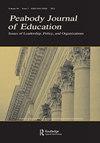当白人父母不那么友善:大流行后美国反crt和反公平政策的政治
Q2 Social Sciences
引用次数: 0
摘要
在美国2022年中期选举的准备阶段,共和党人将他们重新控制国会的斗争带到了全国各地的学区。Astroturf组织在K-12公立学校如何教授种族和种族主义问题方面,展开了一场全国性的虚假宣传活动,保持了一种假象,制造了一种草根支持的印象,隐藏了他们的精英出身和支持。保守团体动员积极分子,在全国范围内参加学校董事会会议,并推翻了学校董事会选举,要求停止向儿童灌输批判种族理论(CRT)。这些努力在致力于促进公平、反种族主义和社会正义的主管和学校董事会成员中产生了寒蝉效应。在这篇描述性的概念性论文中,我们描述并分析了反对CRT和学校公平的全国性运动,它是如何在当地学区层面发挥作用的,以及它对领导公平的主管和学校董事会成员的影响。批判性政策分析的原则用于构建和组织我们对国家虚假信息运动的分析,包括政策文件,博客文章,新闻报道和相关材料,说明其对当地学区的影响。最后,我们讨论了致力于公平领导的管理者和学校董事会成员必须如何理解种族政治和政治景观的有效利用如何破坏当地为促进学校公平和社会正义所做的努力,并考虑了美国公共教育未来的深远影响。注1:阿斯特罗草皮组织保持一种外表,给人一种草根支持的印象,隐藏了他们的精英起源和支持这不是劳顿县的白人家长第一次组织起来反对学校里的有色人种学生。劳顿县的学校系统是弗吉尼亚州最后一个,也是全国最后一个在布朗诉董事会案之后废除种族隔离的学校系统。2020年,该地区正式向黑人社区道歉,为他们在这个时代甚至后来的待遇道歉这些被拒绝的观念被认为存在于诸如恢复性司法、亲和团体、文化响应式教学等实践中,更广泛地存在于任何被贴上反种族主义或公平标签的事物中(曼哈顿研究所,Citation2021)2023年4月,佛罗里达州通过了一项将限制延长到12年级的法案。作者简介:ann LoBue是哥伦比亚大学师范学院教育政策项目的博士候选人。她的研究兴趣包括K-12学校领导的公平和地区治理,特别是学校董事会,她是前学校董事会主席。她的研究发表在《教育管理与历史杂志》上。索尼娅·道格拉斯,哥伦比亚大学师范学院教育领导学教授。她的研究重点是美国的教育领导、政策和政治。她在《教育管理季刊》、《教育政策》和《师范学院记录》等期刊上发表了20多篇文章,并著有《在燃烧的房子里学习:教育不平等、意识形态和(非)融合》。本文章由计算机程序翻译,如有差异,请以英文原文为准。
When White Parents Aren’t so Nice: The Politics of Anti-CRT and Anti-equity Policy in Post-pandemic America
ABSTRACTIn the run-up to the U.S. 2022 midterm elections, Republicans brought their fight to regain control of Congress to school districts across the country. Deploying a national disinformation campaign regarding how issues of race and racism are taught in K-12 public schools, astroturfFootnote11 Astroturf organizations maintain a facade that creates an impression of grassroots support and hides their elite origins and backing. conservative advocacy organizations mobilized activists to descend on school board meetings and upend school board elections nationwide demanding an end to indoctrination of children with critical race theory (CRT). These efforts created a chilling effect among superintendents and school board members committed to advancing equity, anti-racism, and social justice. In this descriptive, conceptual paper, we portray and analyze the national campaign against CRT and equity in schools, how it played out at the local school district level, and its implications for superintendents and school board members leading for equity. Tenets of critical policy analysis are used to frame and organize our analysis of the national disinformation campaign to include policy documents, blog posts, news coverage, and related materials that illustrate its impact on local school districts. We conclude with a discussion of how superintendents and school board members committed to equity leadership must understand how the politics of race and effective use of political spectacle can undermine local efforts to advance equity and social justice in schools, and consider the far-reaching consequences for the future of public education in the U.S. Disclosure statementNo potential conflict of interest was reported by the authors.Notes1 Astroturf organizations maintain a facade that creates an impression of grassroots support and hides their elite origins and backing.2 This was not the first time White parents in Loudoun County organized against students of color in their schools. Loudoun County’s school system was the last in Virginia, and among the last in the nation, to desegregate following Brown v. Board. In 2020, the district officially apologized to the Black community for their treatment during this era and even afterward.3 These rejected notions are supposedly found in practices such as restorative justice, affinity groups, and culturally responsive teaching and more broadly in anything labeled anti-racist or equitable (Manhattan Institute, Citation2021).4 A bill to extend the restrictions in Florida through 12th grade was passed in April 2023.Additional informationNotes on contributorsAnn LoBueAnn LoBue is a Doctoral Candidate in the Education Policy program at Teachers College, Columbia University. Her research interests include K-12 school leadership for equity and district governance, especially school boards, and she is a former school board president. Her research has been published in Journal of Educational Administration and History.Sonya DouglassSonya Douglass is Professor of Education Leadership at Teachers College, Columbia University. Her research focuses on education leadership, policy, and politics in the U.S. She has published more than 20 articles in journals like Educational Administration Quarterly, Education Policy, and Teachers College Record, and is author of Learning in a Burning House: Educational Inequality, Ideology, and (Dis)Integration.
求助全文
通过发布文献求助,成功后即可免费获取论文全文。
去求助
来源期刊

Peabody Journal of Education
Social Sciences-Education
CiteScore
2.20
自引率
0.00%
发文量
43
期刊介绍:
Peabody Journal of Education (PJE) publishes quarterly symposia in the broad area of education, including but not limited to topics related to formal institutions serving students in early childhood, pre-school, primary, elementary, intermediate, secondary, post-secondary, and tertiary education. The scope of the journal includes special kinds of educational institutions, such as those providing vocational training or the schooling for students with disabilities. PJE also welcomes manuscript submissions that concentrate on informal education dynamics, those outside the immediate framework of institutions, and education matters that are important to nations outside the United States.
 求助内容:
求助内容: 应助结果提醒方式:
应助结果提醒方式:


